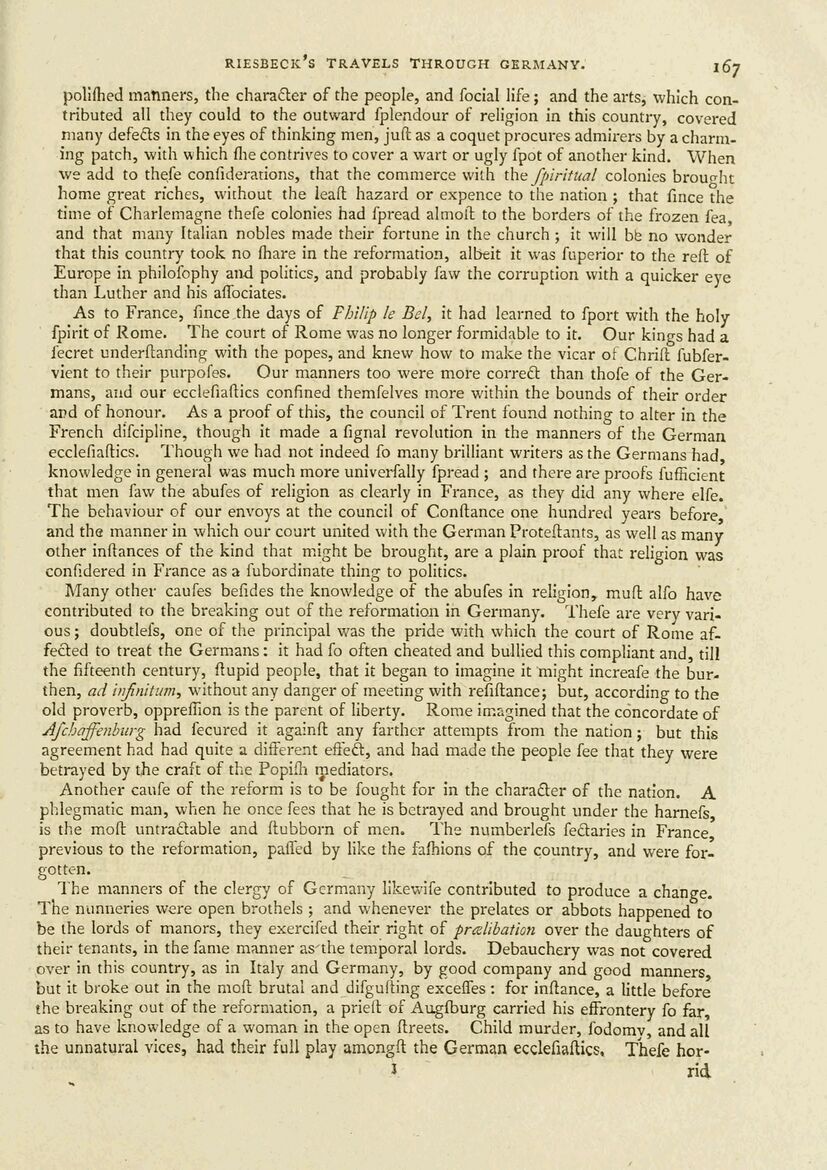
Full resolution (JPEG) - On this page / på denna sida - Pages ...

<< prev. page << föreg. sida << >> nästa sida >> next page >>
Below is the raw OCR text
from the above scanned image.
Do you see an error? Proofread the page now!
Här nedan syns maskintolkade texten från faksimilbilden ovan.
Ser du något fel? Korrekturläs sidan nu!
This page has never been proofread. / Denna sida har aldrig korrekturlästs.
RIESBECK’S TRAVELS THROUGH GERMANY. 167
polifhed manners, the character of the people, and focial life; and the arts; which con-
tributed all they could to the outward {plendour of religion in this country, covered
many defeéts in the eyes of thinking men, juft as a coquet procures admirers by a charm-
ing patch, with which fhe contrives to cover a wart or ugly {pot of another kind. When
we add to thefe confiderations, that the commerce with the /piritual colonies brought
home great riches, without the leaft hazard or expence to the nation; that fince the
time of Charlemagne thefe colonies had fpread almoit to the borders of the frozen fea,
and that many Italian nobles made their fortune in the church; it will be no wonder
that this country took no fhare in the reformation, albeit it was fuperior to the reft of
Europe in philofophy and politics, and probably faw the corruption with a quicker eye
than Luther and his affociates.
As to France, fince the days of Philip /e Bel, it had learned to fport with the holy
fpirit of Rome. The court of Rome was no longer formidable to it. Our kings had a
fecret underftanding with the popes, and knew how to make the vicar of Chrift fubfer-
vient to their purpofes. OQur manners too were more correét than thofe of the Ger.
mans, aid our ecclefiaftics confined themfelves more within the bounds of their order
and of honour. As a proof of this, the council of Trent found nothing to alter in the
French difcipline, though it made a fignal revolution in the manners of the German
ecclefiaftics. ‘Though we had not indeed fo many brilliant writers as the Germans had,
knowledge in general was much more univerfally fpread ; and there are proofs fufficient
that men faw the abufes of religion as clearly in France, as they did any where elfe.
The behaviour of our envoys at the council of Conftance one hundred years before,
and the manner in which our court united with the German Proteftants, as well as many
other inftances of the kind that might be brought, are a plain proof that religion was
confidered in France as a fubordinate thing to politics. ;
Many other caufes befides the knowledge of the abufes in religion, muft alfo have
contributed to the breaking out of the reformation in Germany. ‘Thefe are very vari-
ous; doubtlefs, one of the principal was the pride with which the court of Rome af-
fected to treat the Germans: it had fo often cheated and bullied this compliant and, till
the fifteenth century, ftupid people, that it began to imagine it might increafe the bur.
then, ad infinitum, without any danger of meeting with refiftance; but, according to the
old proverb, oppreffion is the parent of liberty. Rome imagined that the concordate of
Afchaffenburg had fecured it againft any farther attempts from the nation; but this
agreement had had quite a different effect, and had made the people fee that they were
betrayed by the craft of the Popith mediators.
Another caufe of the reform is to be fought for in the charaéter of the nation. A
phlegmatic man, when he once fees that he is betrayed and brought under the harnefs,
is the moft untractable and ftubborn of men. ‘The numberlefs fectaries in France,
previous to the reformation, pafled by like the fafhions of the country, and were for-
rotten.
? The manners of the clergy of Germany likewife contributed to produce a change.
The nunneries were open brothels ; and whenever the prelates or abbots happened to
be the lords of manors, they exercifed their right of prelibation over the daughters of
their tenants, in the fame manner as‘the temporal lords. Debauchery was not covered
over in this country, as in Italy and Germany, by good company and good manners,
but it broke out in the moft brutal and difgufting exceffes: for inftance, a little before
the breaking out of the reformation, a prieft of Augfburg carried his effrontery fo far,
as to have knowledge of a woman in the open ftreets. Child murder, fodomy, and all
the unnatural vices, had their full play amongit the German ecclefiaftics, Thefe hor-
I rid
.
<< prev. page << föreg. sida << >> nästa sida >> next page >>